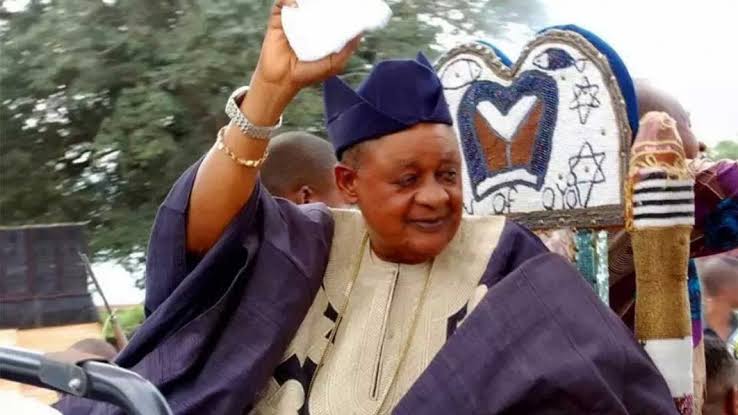At the induction of the executive committee of the Central Council of Ibadan Indigenes (CCII) in October, 2019, I was right beside the stage to get a shot of the Alaafin when one of the bards shocked me with a statement. His voice akin to that of an infantry general, he blurted, “ti won ọ ba fi wọn ṣepe won ii pẹ láyé, Lamidi Àtàndá odo ni ọ gbe ọ lọ” (If you don’t curse them they don’t live long, Lamidi Àtàndá, may you be swept away by a river.).
Who would dare curse the Alaafin to his face? Who would dare carry a lamp and look straight into the eyes of a tiger? I asked myself in amazement. Shockingly, neither the Alaafin nor any of his aides displayed any form of surprise.
The position is absolutely enigmatic and Alaafin Lamidi Adéyemí III had added so much glamour to it. The astonishingly naive would wonder why a man would allow praise singers call him ọmọ iku (the son of death), ọmọ adaba ile (son of in-house conspiracy) or ọmọ àfòmó ode (son of uninvited trouble). Those well versed in the mystery of the throne however understand that they are turned to prayers to lengthen the Alaafin’s life and reign.
Of course, Kabiyesi Adéyemí III revealed the secret of what we held as mystery decades ago. Back in 1995, as students of Local Government Administration at The Polytechnic, Ibadan (before it’s accreditation and subsequent transformation to Public Administration), our first excursion was to Oyo town. Our first port of call was the Local Government Headquarters at Kosobo. Sadly, that part of the trip did not yield much as it was not a working day.
The next point of interest was the palace of the Alaafin of Oyo. Being an Oyo indigene, the President of our association, who doubled as coordinator and tour guide had given us a hint, so at the entrance, we all pulled off our shoes.
After the spokesman had introduced us as members of the Association of Local Government Administration Students (ASLOGAS) from The Polytechnic, Ibadan, Kabiyesi Alaafin Lamidi Adéyemí iII made sure everyone spoke. He asked us to introduce ourselves one after the other, down to our hometowns!
With his deft skills of analysis, Kabiyesi explained the importance of our course of study and its relevance to the future of Nigeria. A part of the visit that never left me was the question and answer time. One of us asked why we had to remove our shoes at the gate and the answer was rather shocking.
“There is no spiritual explanation to it, it is for no other reason than respect for the throne”, Kabiyesi disclosed. Explaining further, he said “you may come in and see that the Alaafin’s shoes cost ₦200 while yours are ₦400. If you are allowed to wear them in, you may compare and go out to brag but if you don’t wear them here, there won’t be any reason for comparison”.
Reading Reverend Samuel Johnson’s “History of The Yorubas” later opened my eyes. The lives of Oranyan, Ajaka the first Alaafin to reign twice, his brother Sango Olukoso, Abiodun Adegoolu, Atiba, Aole Afepeja, Adelu, Olukuewu and Adeyemi all pointed to the fact that denigration of the Alaafin was not one of the things condoned in Oyo.
That the Alaafin institution is indecipherably enigmatic is a fact no one bothers to contest. Apart from indescribable glamour, Alaafin Adeyemi’s other trademark was his encyclopedic knowledge of Yoruba history. He was not sitting on the throne of Oranyan for nothing’s sake, everything about him oozed royalty laced with awe-inspiring brilliance. One wouldn’t have expected anything less from a supremely confident direct descendant of Oranyan and custodian of Yoruba culture.
Kabiyesi never stopped referring to the exploits of the Yorubas especially how the Fulani onslaught was repelled centuries back. He stood for Yoruba unity and true federalism as solutions to the issues faced at the regional and national levels.
His transition is not just the end of an era in Oyo and Yorubaland, it marked the end of a triumvirate that consisted of him, High Chief Lamidi Adedibu, the Strongman of Ibadan Politics who was interestingly nicknamed the Alaafin of Molete in Ibadan and the then Aare Musulumi of Yorubaland, Aare Arisekola Alao.
At the 60th birthday celebration of Olori Abibat Adéyemí, Arisekola Alao’s gift to the celebrant was a brand new car, driven right into the reception venue. And on High Chief Adedibu’s birthday, the Alaafin personally came to Molete to pray for him. As expected, Iku quoted copiously from the Qu’ran and relevant verses of the Ifa corpus.
The trio made up a formidable force and it was obvious that having the blessings of the three spelt good fortune politically, spiritually and financially.
While many see the transition of Alaafin Adéyemí as the end of the old order, those well versed in traditional matters see it as adumbration of the fears that Yoruba culture is gradually fading away.
in time past, the Alaafin’s demise was officially announced by the beating of the Koso drum in the evening. And no one would say a word about it till the Basorun makes it public. Moreover, Yoruba obas were never pronounced dead. While in other places, “oba waja” (the king has entered the vault) was the right way to put it, in Oyo, they simply say “Ile bajẹ” (the ground has spoilt).
This time however, no one waited for the official announcement. Even before the mainstream media got wind of it, bloggers had bombarded the internet with various headlines, many of which vitiated Yoruba monarchical institutions.
Oh, yes we are in the days of the new normal but we are fast losing it as Yorubas.


